Yes, I know. Crusader of Centy (hereafter referred to by its Mega Drive name, Soleil) is obviously influenced by Zelda, particularly A Link to the Past. Have I got that out of the way? I will come back to this briefly towards the end but I want to focus on the game from the perspective of someone who had never played or even seen A Link to the Past, when he first played it.
My Childhood Experience
I first saw Soleil reviewed in a magazine in 1994, and I wanted it straight away. At the time, I had never seen anything like it, and I was certain I would love it. When I found a copy in a shopping mall some months later, I immediately chose it as a birthday present even though my birthday was still a long way off at the time. After about year after first seeing it, on my thirteenth birthday, I was playing as Corona on his fourteenth birthday (close enough).
My initial impressions were not wrong; I did love it. I played through it countless times, and it becoming easily one of my favourite Mega Drive games. I also became one of those games that I was obsessed with finding new secrets. My younger brother also absolutely loved it, and in hindsight, it isn’t surprising at all that the next time I felt this way about this kind of game was in regards to a certain Nintendo 64 classic about an Ocarina.
Older and Wiser
When booting up the cartridge, there is quite a contrast between the opening and when actually beginning the game. The dark opening is soon followed by a very happy town melody and the town itself absolutely saturated in colour. Everything seems peaceful but as told in the beginning, there are monsters lurking beneath and soon to return. Soleil is an epic adventure in many ways as the young boy Corona goes on a journey that passes far away from his home through unknown lands, through time and even heaven. Beneath the otherwise common “Humans vs. Monsters” plot is a far more nuanced story that questions almost from the beginning the evil nature of the monsters. This is nuance is weakened somewhat by the fact that you are frequently attacked by monsters but it comes out stronger in the latter part of the game. It is also something I hadn’t experienced in a game or indeed any fantasy medium at that time.
In addition to this are some religious themes that seemed lifted largely from Christianity but with parallels that can be found in other religions, too. This is not to say that the game is religious, but the themes are stronger than in almost any other game I’d played at the time, and certainly so for the genre. As a child when I first played it, this was rather heavier than the simple to understand plots of most games where you were just a hero with a monumental but straightforward task. It was not until I began writing this that I learned that this aspect was changed for the North American localisation.
I mentioned the vibrant town that you begin the game in, and indeed much of the game world is colourful. There are still much darker and dangerous areas as you progress, and the music along with the colour palette changes to reflect this. The music in the town and overworld is always upbeat and catchy and definitely the kind I got stuck in my head, to the point where I can hum many of the tunes today. The music in the darker areas takes a matching tone and while not as catchy, are still excellently composed. The visuals and music remain as striking to me today as when I first played them, though I certainly have the nostalgia goggles on in stating this.
Soleil’s most interesting novelty gameplay-wise is the use of animals to help you. Very early in the game, you are given the ability to communicate with animals, at the same time losing the ability to communicate with humans. This happens just after you have met your friends and family, and it closes the world you know while opening up a new one. Beginning with your dog, who joins shortly after you start talking to him, you have animal companions to help you along the way. When the mechanics are broken down, the animal friends are essentially just items, but the way they are introduced and your relationship with them makes it at least feel different. This concept is further enhanced by the ability to combine animals abilities to create new or more powerful abilities.
Apart from the animals, the gameplay is quite a simple action/RPG. Most of your fighting is done with a sword which can also be thrown at enemies. The sword can be enhanced with different animal combinations, and this becomes more and more important as the game progresses; however, most of the time you’re just slashing enemies as you move through the many diverse environments.
The Link That Can’t Be Severed.
At the time that I played the Soleil, the only Zelda game I knew about was Zelda II: The Adventures of Link. The change in perspective threw off any comparison I would have made between the Zelda series and Soleil. The next Zelda – and to this day, my all time favourite – was Ocarina of Time, and I again made no connection. The same was true of Link’s Awakening, which I also played around the same time. It was only many years later when browsing sites like Sega-16 and when I finally played A Link to the Past that I saw the connection. So for me, Soleil was never a “Zelda clone,” only a title I saw on its own merits.
As I’ve now played the games that influenced them, I can see where Soleil’s shortcomings are in comparison. The world is nowhere near as large and certainly contains nowhere near as many secrets. The visuals and soundtrack, as mentioned, remain impressive but still don’t match the quality of A Link to the Past. Soleil has a wide variety of locations, but it is still a rather short adventure, even without the comparison. The one area where it really stands ahead is with its interesting story and even an interactive ending. I understand that the plot is somewhat diminished in the North American localisation, but the themes were still unique. While acknowledging all this, I still prefer Soliel to A Link to the Past, if only because I played it first.
My most recent playthrough ended abruptly when I turned the Mega Drive on one day to discover the battery had finally died. My PAL copy is long gone, and I now own the considerably cheaper Japanese version which I find fairly easy to play with my limited Japanese ability and unforgotten knowledge of almost every aspect of the game. It is a shame that owning a copy is beyond what most people are willing to spend, as it is a game that deserves to be appreciated on its own merits. At one point in the game when your character learns to jump, the rabbit who teaches you says “where there’s a will there’s a way.” That has become something I say to myself even today when I encounter a new challenge. This probably best illustrates how much the game meant to me as a kid.
Enjoy some of the great artwork for Soleil/Crusader of Centy!

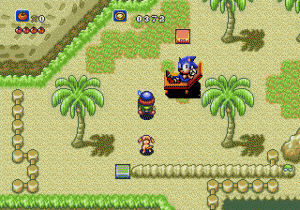
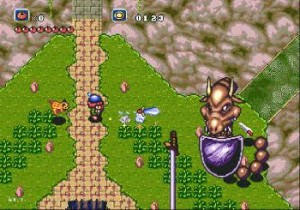
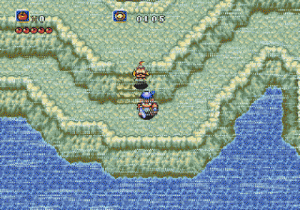
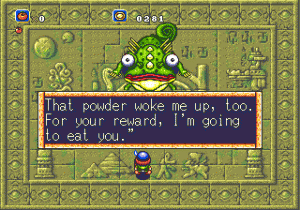
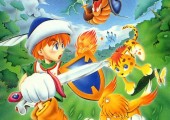
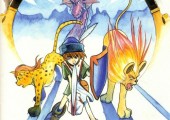
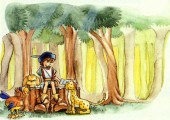
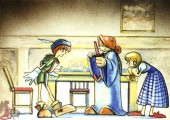
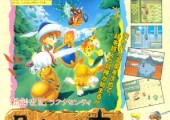
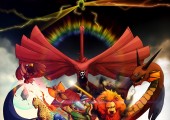
Pingback: Video Game Reviews & Articles | The Essential Malady
Pingback: Sega-16 Articles | The Essential Malady
Pingback: My new Sega-16 Article on Soleil |